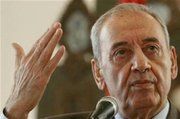
A parliamentary session set for Tuesday to elect a president has been re-scheduled for April 22, Speaker Nabih Berri's office announced.
"Parliament speaker Nabih Berri has decided to postpone the session to April 22 at noon (0900 GMT)," his spokesman, Ali Hamdan, told Agence France Presse.
The postponement is the 17th such decision by Berri since September when the house was supposed to elect a successor to pro-Syrian head of state Emile Lahoud.
BEIRUT (Reuters) - Lebanon's parliament speaker said on Sunday he would invite rival Lebanese leaders for direct talks if an Arab summit in Syria this week failed to find a solution to the country's political deadlock. Nabih Berri, also a leader of the Syrian-backed opposition, indicated he would postpone for the 17th time a parliament session to elect a new president from Tuesday due to a lack of progress towards ending the crisis.
A delay would mean that there would be no Lebanese president to attend the March 29-30 Arab summit in Damascus. Lebanon has been without a president since Emile Lahoud's term ended in November. Arab divisions over Lebanon have cast a shadow over the meeting with several key leaders expected to stay away, blaming Syria for blocking an election in Lebanon. The crisis, Lebanon's worst since the 1975-90 civil war, has paralyzed the government and led to bouts of deadly sectarian violence. It has also strained ties between Syria and regional Arab power Saudi Arabia, which back opposing sides in the conflict. Speaking in a live interview with Lebanon's New TV, Berri said he would consult Arab and foreign leaders on his next steps if there were no breakthroughs at the Damascus summit.
"I will call (for a) dialogue to consult over (formation) of a national unity government and (drafting a parliamentary) election law," Berri said, adding that the law was the main sticking point between the two rival camps.
Berri chaired two rounds of talks between the ruling coalition and the opposition in 2006. Though progress was made on several points, the talks failed to settle all the differences and the rift has deepened considerably since.
The speaker said he would call on the 14 leaders who participated in the 2006 talks to meet again in April if there was no progress at the summit.
Saudi Arabia supports the Beirut governing coalition, which is backed by the United States and France, while Syria and its ally Iran back the opposition alliance led by Hezbollah.
The Lebanese rivals have agreed that army chief General Michel Suleiman should fill the presidency but his confirmation by parliament has been delayed by a dispute over the make-up of a cabinet to be formed after his election and the law governing a general election scheduled for 2009.
Parliament can not convene to elect the president unless there is a deal between the rival camps that will secure a quorum for the vote.
"There is nothing stopping a postponement," Berri said of Tuesday's session to vote on the president. He did not give any possible new date for the election.
(Writing by Nadim Ladki; editing by Sami Aboudi)